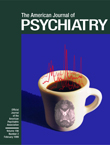Caffeine Intake, Tolerance, and Withdrawal in Women: A Population-Based Twin Study
Abstract
OBJECTIVE: Caffeine is by far the most commonly consumed psychoactive substance. The use and abuse of most other licit and illicit psychoactive drugs have been shown to be substantially heritable. However, the impact of genetic factors on caffeine consumption, heavy use, intoxication, tolerance, and withdrawal is largely unknown. METHOD: Caffeine consumption, in the form of brewed coffee, instant coffee, tea, and caffeinated soft drinks, as well as caffeine intoxication, tolerance, and withdrawal, were assessed by personal interviews of 1,934 individual twins from female-female pairs ascertained from the population-based Virginia Twin Registry. The sample included both members of 486 monozygotic and 335 dizygotic pairs. Twin resemblance was assessed by probandwise concordance, odds ratios, and tetrachoric correlations. Biometrical model fitting was also performed. RESULTS: The resemblance in twin pairs for total caffeine consumption, heavy caffeine use, caffeine intoxication, caffeine tolerance, and caffeine withdrawal was substantially greater in monozygotic than in dizygotic twin pairs. Model fitting suggested that twin resemblance for these measures could be ascribed solely to genetic factors, with estimated broad heritabilities of between 35% and 77%. CONCLUSIONS: Caffeine is an addictive psychoactive substance. Similar to previous findings with other licit and illicit psychoactive drugs, individual differences in caffeine use, intoxication, tolerance, and withdrawal are substantially influenced by genetic factors.



